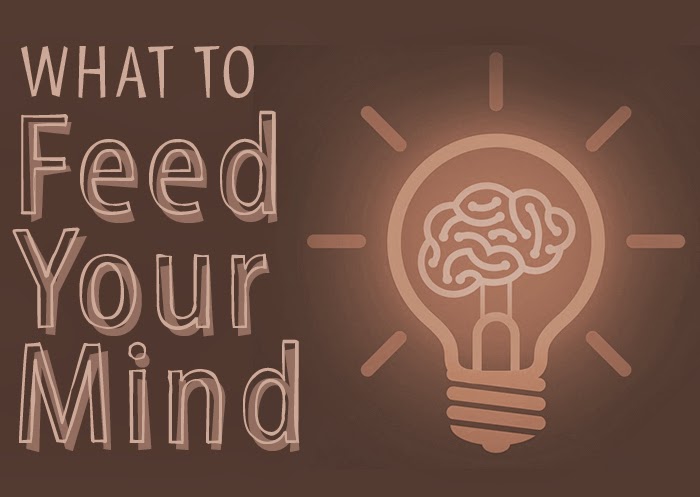As is the case of so many everyday catch phrases, "you are what you eat," contains an important message—though wrapped in a trite idiomatic saying—that the food we take into the body eventually becomes and sustains the body. If we are to maintain health, its beneficial to consume a nourishing, balanced diet. Now, we might find such a message obvious, but it asks us to perceive experience in a manner that’s both essential yet not easy for many of us, namely taking into consideration the long term results our actions. The Snickers bar tastes sweet, the Red Bull provides a quick energy boost, but they don't provide path to lasting health and vitality. When we suppress thoughts about the long term ramifications of a cheeseburger and milkshake, we’re living as actions don’t have results; like an infant covering its eyes to avoid a scary situation, we act as if what we don't acknowledge can't hurt us.
It was quite clever, then, of the Buddha to use appetite and digestion as a metaphor for the larger issues of creating suffering in life, for the underlying processes are similar: What we focus the mind on and ruminate over (thoughts, memories, sensory perceptions and on) eventually turns into the future mind states. We have to live in minds influenced by every idea we’ve mulled over from our darkest, unacknowledged intentions and obsessive fears to our most refined thoughts of generosity, virtue and appreciation. The Buddha’s theory of stress origination (paticca samupadda), along with his choice of words, are unmistakable. In each new situation in life we harbor underlying, largely somatic feelings, breathing patterns and mental energies that, working in unison, urge as to how we should proceed. Perhaps someone gives us a hostile look; our underlying feelings of discomfort urge us to disengage and end the interaction. If a situation provides us with an opportunity to gain a feeling of security, we feel comfortable about the experience, and develop what's been translated as 'craving.' Yet the word the Buddha actually used—tanha—doesn't mean "craving," it really means 'thirst' or appetite. And so the mind gets a small taste of something and wants to taste, or experience, more of it.
Next in the sequence is upadana, which has been translated variously as clinging, grasping or attachment. Yet upadana really means 'to feed on' or ingest. So the Buddha was expressing that encountering an immediately positive experience, we get a taste of underlying ease and crave more. The mind starts to seek sustenance from pleasant events, and as the conditions fade away, we keep them going in the mind as thoughts, memories or plans, mulling them over, ruminating, feeding off (clinging to) a now imaginary experience (note how we often ask for time to think something over as "let me chew on it."). Much of what the mind tries to digest isn’t real—we’re mentally feeding on long dead and rotten memories or completely hollow fantasies, hoping they’ll sustain the mind. This is like trying to sustain the body on a diet of fetid roadkill and cotton candy.
Just like there are healthy and unhealthy foods, there are beneficial and unwholesome thoughts, moods and perceptions. As sugary snacks tastes good in the short term but depletes the body down the road, thoughts of greed, self-righteous anger and envy often taste good in the mind at first, as they provide a sense of illusory power (dopamine and adrenaline rush). Alas, down the road such thoughts create week and agitated states of consciousness. The Buddha helpfully provided a list of the four types of harmful content the 'run of the mill' mind likes to focus on:
• conditional experiences that bring short term pleasures (shopping, intoxication, compulsive sex, people pleasing and on)
• views and opinions about how the world should be and everything that's wrong with life
• routines we've ingrained through habits and repetition that we defend as "the right way to do things"
• self-absorbed thoughts, especially those that try to define our true nature, predict our future, or compare us to others
Each of the above types of mental content are terribly addictive (ie lead to obsessions), as they provide fleeting experiences of security and happiness, but the good times don't last, and we're left with even greater appetites.
So the goal of the buddha was the middle path, not one of completely giving up on consuming nutrients, but feeding in a way that doesn’t create addictive thoughts. Just as he instructed practitioners to focus on eating enough to sustain a healthy body, we should consume enough information and digest enough ideas to sustain the mind, to keep it active and engaged. But we want the mind to feed on nutrients: thoughts of appreciation for supportive friends, awe at life’s wonders, gratitude for our skills and abilities, recognition our virtues and generosity of spirit, acknowledgement of our impermanence, discerning which actions bring us long term happiness and which bring suffering. Once we learn how to feed the mind and exercise it, we finally need to be patient for the results, which will appear, though not necessarily to our time table. Just as its foolish to expect muscles after one’s first week at the gym, so to does mental development (bhavana) require time to take hold. But when it does, its worth every bit of the effort.

Comments
Post a Comment